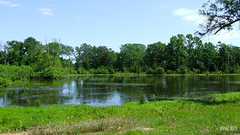 |
| (Photo credit: gval.net) |
By Bill Graham, MDC
KANSAS CITY, Mo -- There are some upsides to this summer’s withering heat and drought conditions that have lowered pond and lake levels. In ponds with deep enough water for fish to survive, the big fish are eating well. For pond owners, low water offers a good time to make improvements in ponds that can help in future drought.
Some ponds receive too little fishing pressure, said Scott Ryan, MDC Fisheries regional supervisor for Northwest Missouri. That can lead to stunted growth in bass and bluegill. Plus, vegetative growth can get heavy near pond banks and keep prey fish hidden.
But when water levels drop below vegetative lines, prey fish are forced into deeper water with the predators like largemouth bass.
“This allows the stunted largemouth bass the opportunity to grow significantly with the newly available food source,” Ryan said, “and by thinning the number of bluegill, the surviving bluegill have more food so they too will tend to grow to a larger size.”
The setback for vegetation can also provide a few years with less growth and improved fishing conditions for anglers.
“One of the biggest problems landowners report with their ponds is excessive vegetation,” he said. “If water levels stay low over the winter, a significant portion of emergent vegetation will be exposed to winter freezes and will not survive into next year. Droughts can improve the overall conditions in many ponds.”
Shallow depths and hot temperatures can cause low oxygen levels in pond water, which can cause fish kills. A partial fish kill in a pond with an overabundance of fish can thin out the weaker fish and allow survivors to grow larger in coming years, Ryan said.
Major fish kills are not good. Some have been reported in shallow ponds this summer. The best prevention for summer fish kills is to construct ponds properly or deepen them if siltation occurs, said Jake Allman, MDC Fisheries biologist in the Kansas City region. Ponds that have water depths eight feet or greater over at least 25 percent of the pond’s acreage are much more likely to keep fish alive during these hot and dry conditions.
If your pond does have a fish kill, it may be time to deepen it and make it more hospitable for fish in extreme weather, Allman said.
Good rains, full ponds and healthy aquatic ecosystems make for happy fishing outings. But even in this summer of extreme drought, the fish in many ponds will survive and thrive in seasons ahead.
For more information, visit MDC online at mdc.mo.gov/landwater-care/





No comments:
Post a Comment